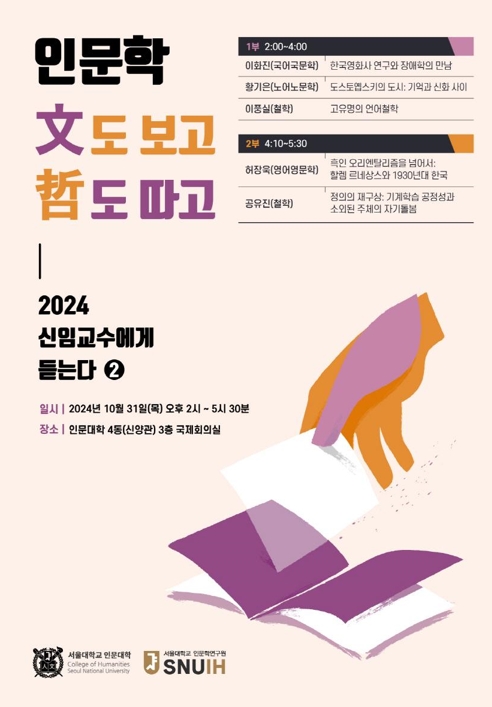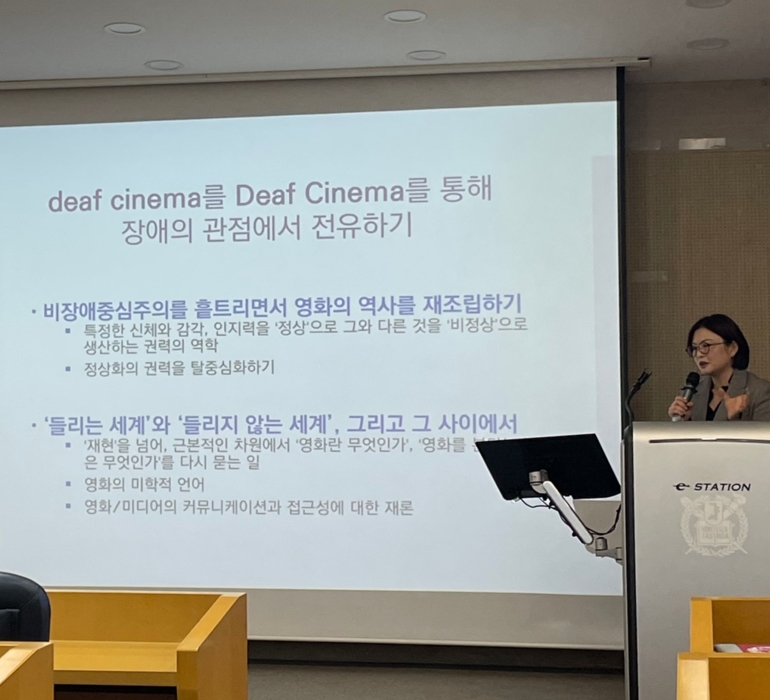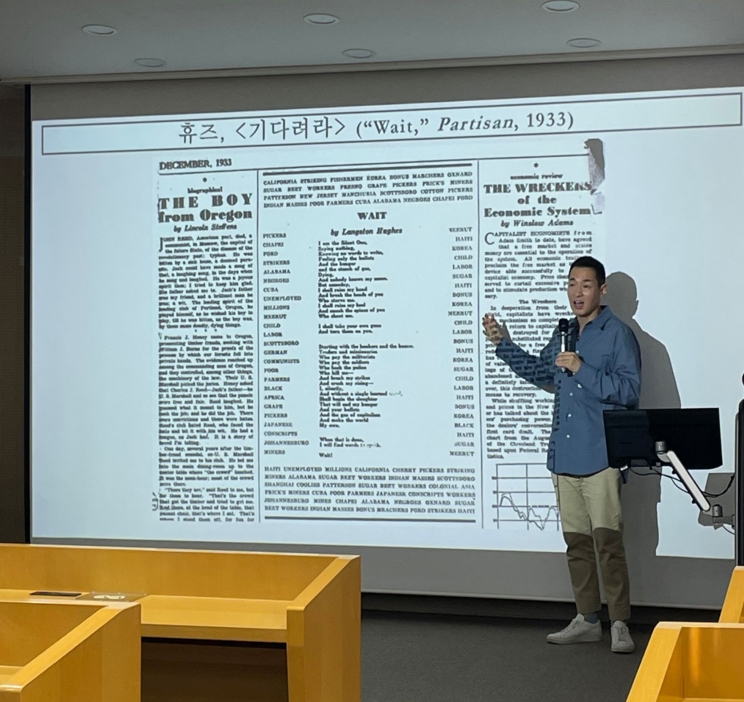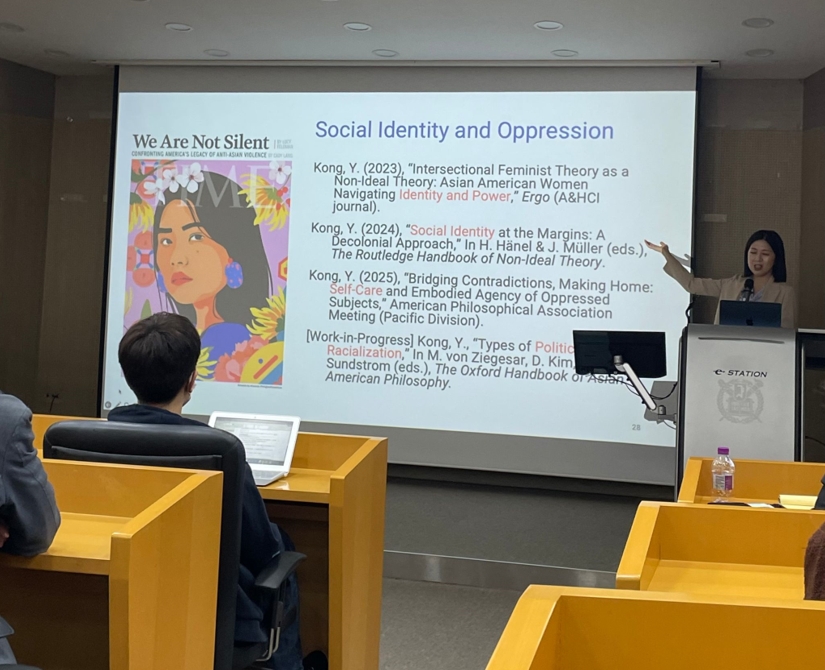On October 31, the College of Humanities and the Institute of Humanities co-hosted the second installment of its lecture series, “Delving into Literature and Philosophy in the Humanities” inviting students and faculty to engage with new professors and their latest research. Although the College of Humanities has traditionally provided new faculty members with the opportunity to share their research interests, it is only recently that students have been invited to attend these lectures. The professors speaking included: Lee Hwajin (Korean Language and Literature), “Merging Korean Film History and Disability Studies”; Hwang Kiun (Russian Language and Literature), “Dostoevsky’s Cities: Between Memory and Myth”; Lee Poong Shil (Philosophy), “The Language Philosophy of Proper Nouns”; Huh Jang Wook (English Language and Literature), “Beyond Black Orientalism: The Harlem Renaissance and 1930s Korea”; and Kong Youjin (Philosophy), “Reconceptualizing Justice: Fairness in Machine Learning and the Self-Care of Marginalized Subjects.”

The Poster for the Humanities Lecture Series
The first lecturer for the day was Professor Lee Hwajin. In her lecture, she revisited Deaf cinema in Korean film history through the lens of disability studies. In particular, she explored how Deaf cinema has often been appropriated by hearing filmmakers and critiqued them from the perspective of Deaf audiences. Professor Lee traced the history of Deaf representation and eugenics discourse in Korean cinema, noting that Deaf characters have often been portrayed by hearing actors—typically inaccurately and with little regard for Deaf audiences. She stressed the necessity for a reconfiguration of the power dynamics that characterize specific physical, sensory, and cognitive abilities as “normal” or “abnormal,” and called for greater accessibility in cinema. Professor Lee concluded by advocating for an approach that treats disability as a verb rather than a noun, and emphasized the need for Deaf cinema created specifically for Deaf audiences.

Professor Lee presenting her lecture
Another lecturer, Professor Huh Jang Wook, presented a talk titled “Beyond Black Orientalism: The Harlem Renaissance and 1930s Korea.” In particular, he examined the links between famous Black literary figures and Japanese-occupied Korea through a study of literary records. Professor Huh detailed how African-American works were often translated, and thereby used, by Korean poets as a means to express anti-colonial sentiment amidst strict Japanese censorship. He highlighted figures like Han Heuk-gu, who published studies on Harlem Renaissance writers and translated Hughes’ poem “Our Land” with intentional anti-colonial undertones to circumvent Japanese restrictions. Other Korean intellectuals, such as No Cha-yŏng, also translated African American literature from Japanese to Korean and deliberately infused it with anti-colonial spirit. Through his lecture, Professor Huh illustrated how Korean engagement with Black literature during the 1930s reflected Korea’s own struggles under colonial rule, revealing a layered, transnational connection.

Professor Huh presenting his lecture
In the final lecture, “Reconceptualizing Justice: Fairness in Machine Learning and Self-Care of Marginalized Subjects,” Professor Kong Youjin explored justice and injustice through the interdisciplinary fields of social philosophy, feminist philosophy, and AI ethics. She examined how machine learning algorithms—often used in recidivism prediction and facial recognition—can perpetuate biases that disproportionately harm marginalized groups. Professor Kong critiqued the traditional distributive equality model, which theoretically seeks to allocate opportunities and resources fairly across groups but, in reality, falls short of addressing deeper, relational injustices. She contended that AI fairness should extend beyond equal distribution to address representational harms that reinforce social hierarchies through negative stereotypes of marginalized identities. Drawing on Elizabeth Anderson’s concept of “relational equality,” Professor Kong advocated for a framework where AI not only distributes resources fairly but also respects the equal moral worth of all individuals. Beyond algorithmic fairness, Professor Kong also discussed the moral complexities of self-care among marginalized individuals, proposing that the binary of resistance versus compliance often fails to capture the lived contradictions of oppression. By illustrating how both resistance and compliance can inadvertently uphold oppressive structures, Professor Kong proposed that marginalized individuals adopt contradiction-bridging practices to cultivate spaces of self-care and home-making within systems of structural injustice.

Professor Kong presenting her lecture
This lecture series offered a valuable opportunity for the SNU community to engage with the innovative research of new faculty members across diverse fields. From rethinking Deaf representation in Korean cinema to reconceptualizing fairness in AI, each presentation offered interesting insights on critical societal issues. As these scholars continue to shape the academic landscape at SNU, their work promises to ignite transformative conversations and drive interdisciplinary research that will guide the future of the humanities. We warmly invite all who are interested to join us for future lecture series.
Written by Hyun Kyung Jung, SNU English Editor, jhyunk@snu.ac.kr

